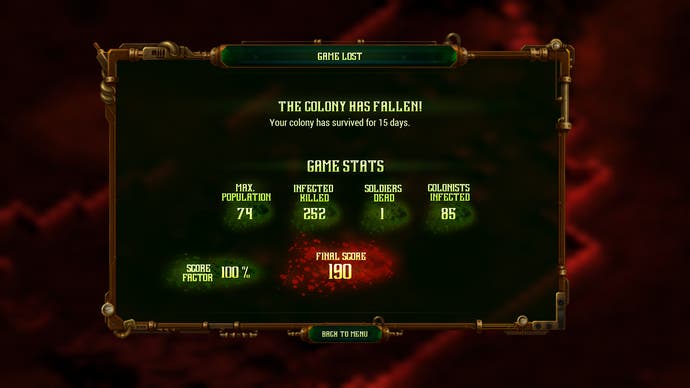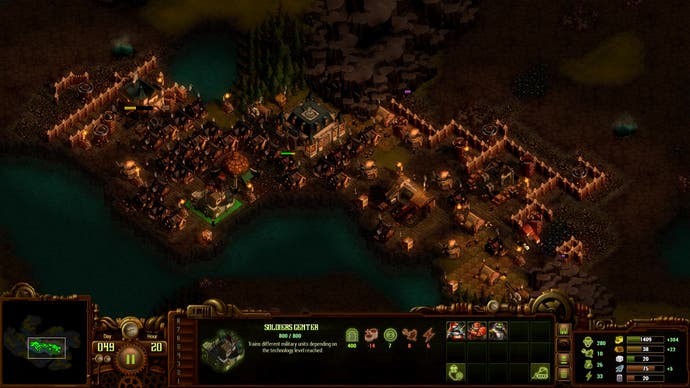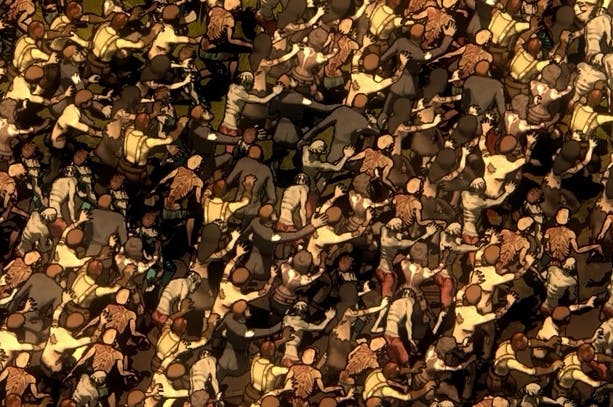They Are Billions is an unputdownable RTS revelation
"Infected horde approaching from the west!"
How long can you survive? It's so simple and so effective: build a base and protect it from the enemy zombie hordes. Not the ones milling about on the map, although they do trickle towards your base and sometimes with proper intent, but the actual hordes. When they approach they get a special announcement and a clock ticks down to their arrival, and a big skull represents them marching across the map. So much drama! When they turn up, you'll know why.
Zombies that are harmless in ones or twos are devastating in their hundreds, and if your walls and traps and troops aren't strong enough, and the zombies reach your vulnerable workers, they will infect them and the wave will get stronger. If you don't patch the hole quickly, zombies will sweep through your base like sea through a sandcastle. Dying in They Are Billions is an inevitability, and death comes quick.

But the difficulty is a masterstroke, as is the speed at which The End comes. Keeping you on the back foot compels you to do better, and dying quickly means you don't lose much, attempts are brisk, and you aren't overwhelmed by wiping the board clean and starting again. It also naturally breaks the learning into digestible chunks.
At the beginning, when you don't know how things work and you die quickly, you have a smaller base, so fewer variables to consider when you die. You easily see where you can do better next time. And so next time you survive for longer, bringing a few more variables into play. Rinse, repeat, each time learning incrementally more.
The bit-by-bit approach makes the game's content go further by rationing it out. Because you'll only see a fraction of the available buildings and units, naturally you'll play again to see more. You can lower the difficulty to bypass this but you won't want to, because at the end of each attempt you're awarded a score. If you lower the difficulty, your score modifier drops with it. Even though I survived much longer on a lower difficulty, building a bigger and more advanced base, my finishing score wasn't much better than my first I-don't-know-what-I'm-doing attempt. I won't drop the difficulty again because I want a better score. Over and over again, the desire to try again is reinforced.
They Are Billions takes a little getting used to. On the surface it's a familiar real-time strategy game: a kind of steampunk Warcraft RTS, with similar clean lines and character, and it behaves very similarly. You harvest resources to build with and slowly research better things. Instinctively, you'll know more or less what to do.
What take some getting used to are the upkeep mechanics: workers, food and energy. You need workers to operate buildings - the more advanced, the more workers you need - and to create troops, but you also need to feed workers and power buildings. Balancing all three isn't easy. Workers come from building tents, but you can't build loads of tents because you won't be producing enough food. Food comes from hunter's lodges and fisheries, but you can't build loads of them because of their energy upkeep and space requirements (two of the same kind cannot be near each other). It's a similar story for energy, which requires workers, and that's on top of base resource costs.

What the upkeep systems do is stop you having everything. You can't simply or easily amass an army, as the trade-off will mean limping towards researching stronger walls, for example. You must focus and choose either or, but not both. It's in many systems like these, as well as constantly trickling enemies in from all sides - probing to find even the smallest hole in your defences - that They Are Billions keeps you thinking. Let just one zombie in and you could begin an infection chain-reaction which will quickly get out of control. You will need to be sharp to survive, and know immediately - when the approaching horde is announced - which are your easts and wests (dramatic sigh).
In They Are Billions, Numantian Games has an irresistibly moreish mix of tower defence, real-time strategy and survival, and I'm only scratching the surface of the £20 Steam Early Access build. The fledgling challenges I've faced are piddly in comparison to the exhilarating apocalyptic hordes others have seen, hence the game's name. And They Are Billions is still missing its main event, the 40-hour-plus Campaign mode, expected sometime in the spring. A full release date, however, is unknown.


